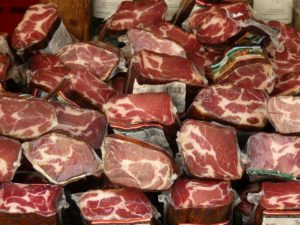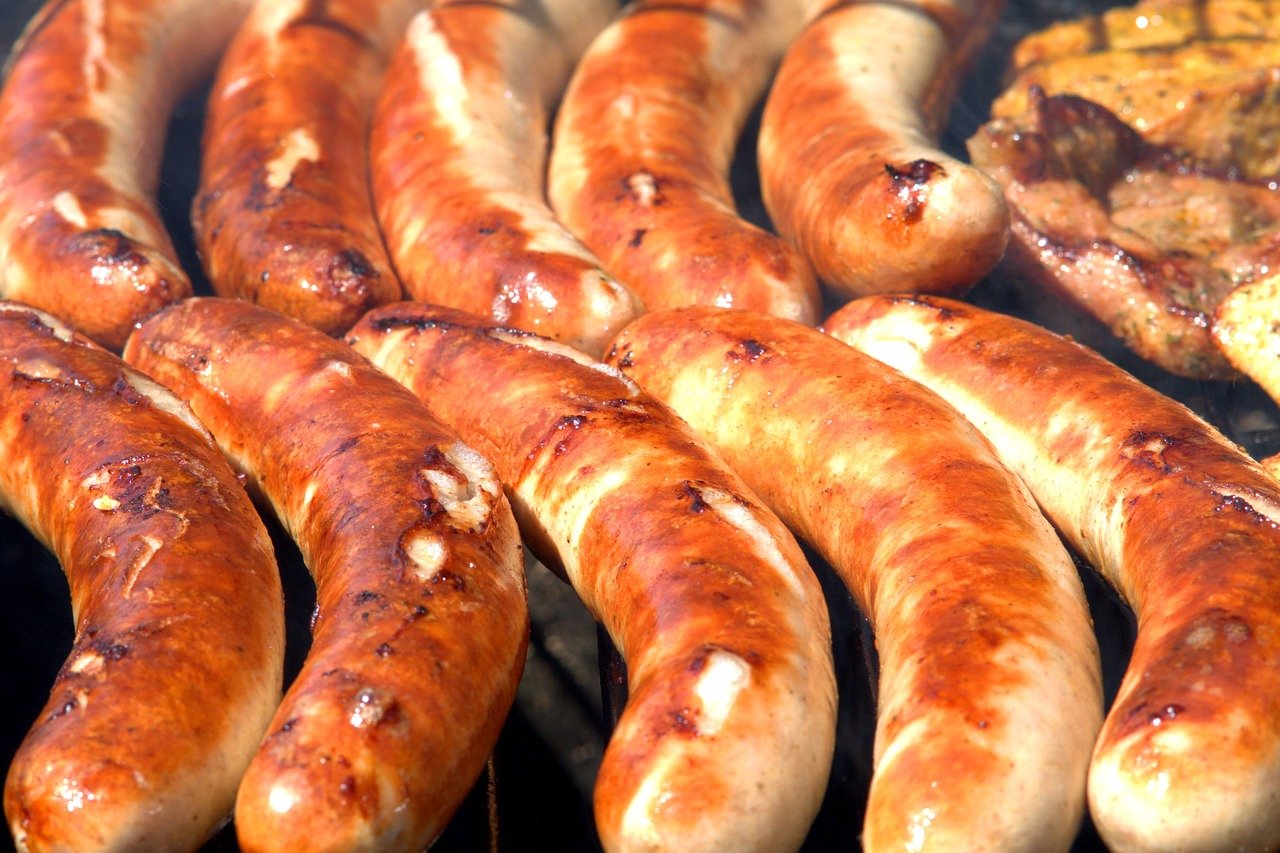At the end of September, half a year into the pandemic, Smithfield Foods fulfilled a pledge to donate 10 million pounds of animal protein — the equivalent of 40 million servings — to food banks across the United States. Smithfield touted the operation as an example of its dedication and sacrifice to keep America fed during the pandemic, during which time at least 42,534 workers in America’s meatpacking industry contracted Covid-19, resulting in 203 deaths. But the donation obscures the fact that Smithfield, along with five other multi-billion dollar companies that own the majority of meatpacking plants in America, has failed to provide workers with safe conditions. These companies — functioning as a meat monopoly — have so far escaped liability. But this could soon change thanks to new precedents in antitrust law enforcement.
Covid-19 hotspots have been spreading within the processing plants of the six companies that control meatpacking in America. In April, at a time when many businesses and institutions shuttered in order to stem the spread of the disease, the Trump administration enacted the Defense Production Act to keep the Big Six monopoly — Tyson, JBS, Cargill, National Beef, Hormel, and Smithfield — in operation. Enacted via an executive order, the act deems meat processing as “critical infrastructure,” requiring employees to continue showing up for “essential” work.
Also in April, the Occupational Safety and Health Administration (OSHA) launched an investigation into Covid-19 at meatpacking plants, resulting in recommendations issued in September for Smithfield and JBS to implement social distancing in their processing lines by erecting barriers. But Smithfield refused, with CEO Kenneth Sullivan stating that erecting barriers wasn’t possible based on the processing line set-up, which optimizes efficiency by placing workers shoulder-to-shoulder without extra space to distance. Citations from OSHA’s investigation stated that the companies “did not develop or implement timely and effective measures to mitigate exposures” throughout the intervening months of the pandemic. Critics condemned OSHA’s lackluster response. By September 2020, when over 200 workers in JBS and Smithfield plants died from Covid-related complications, OSHA issued a paltry $29,000 total fine to the companies for their failures to provide safe working conditions.
Even without an ongoing public health crisis, the intensive farming methods employed by the Big Six monopoly can facilitate the propagation of disease and pandemics, putting both humans and animals at risk. Factory farming optimizes profits by crowding animals into unsanitary conditions, creating an ideal breeding grounds for pathogens. The stress that animals experience living in such conditions can weaken their immune systems, rendering them more susceptible to disease. The outbreak of H1N1 in 2009, and cases of Mad Cow disease since 2003, resulted in recalls of pork and beef, but not systemic changes to how we raise and consume animals. Instead, the number of factory farms is rising across the United States, further consolidating the power of the meat monopoly. Rather than reckoning with the fact that factory farming is crowded, often unhygienic, and stressful conditions for animals produce disease, the meat monopoly continues business as usual.

Conglomerates like Smithfield and Tyson are to ranchers what Apple and Google are to small tech entrepreneurs: industry giants that create impossibly high barriers to entry and hold enough clout to fix prices and force out competition. The monopoly structure that prevails in animal agriculture has resulted in the U.S. now having fewer farmers than during the Civil War, when the population of the United States was less than 10 percent of what it is today. In May, an episode of The Washington Post’s podcast All Told captured rancher John Campbell’s reflection on the ingrained power of the meatpacking monopoly: “I don’t know that there will be any big push to try to help the one percent of the population — and I’m talking about us ranchers — to break up a food monopoly that’s feeding the masses. I don’t think [the government] want[s] to mess with that.”
The companies in the meat monopoly have been protected from liabilities by the outgoing administration. Trump’s executive order keeping the monopoly operating absolves the companies from liability if workers become ill or die from Covid-19, furthering the subversion of workers’ rights these companies have engaged in for years, such as Tyson’s ongoing coercing of workers to any claim against the company in order to receive Tyson-controlled medical care. The meat monopoly’s immunity from liability extends beyond health concerns as well. Covid-19 hotspots that temporarily shut down slaughterhouses led to an oversupply of animals, forcing their supplier farmers to cull millions of animals with no place to sell the bodies — wasted deaths and lost income for which the meatpackers face no legal ramifications. Instead of acknowledging and addressing unnecessary culling and poor safety practices, moneyed interests from the meat monopoly funded efforts for special immunity by cutting 2020 campaign checks to the Republican attorneys general in exchange for civil liability protections. With an incoming Democratic administration focused on bringing the pandemic under control, the classification of these monopolies as essential services could change.
Despite the Big Six’s political clout, four of the companies — JBS, Tyson, Cargill, and National Beef, which together control 80 percent of beef production — are currently subject to a class action lawsuit for violating antitrust laws. Their monopolistic, price-fixing practices enabled these companies to continue to sell beef at inflated prices during the first weeks of the pandemic, but it was only by May that the Department of Justice (DOJ) began an antitrust investigation. Bill Bullard, CEO of the Ranchers-Cattlemen Action Legal Fund and a lead plaintiff in the DOJ’s antitrust suit, said that collusion by meatpackers drove prices for cattle down by almost one-tenth, making ranchers desperate to sell their cattle at reduced prices even while consumer beef prices steadily rose. By June, the DOJ subpoenaed four of the six meatpacking companies. Yet one of these, National Beef, reported that the requests for information were “very narrow in scope,” leading it to surmise that “the DOJ does not necessarily believe there is an antitrust issue.”
It remains to be seen what legal actions the upcoming administration will take in the aftermath of this antitrust probe.
While the government has historically afforded preferential treatment to the Big Six meat monopoly, antitrust lawsuits are being brought up against other major monopolies — like that of the tech giants of Amazon, Apple, Facebook, and Google — indicating a potential shift in how the incoming government will treat monopolies. Congress published a report in early October finding that tech companies “each hold monopoly power and, in some cases, should have parts of their businesses effectively broken up.”
Breaking up the meat monopoly could return economic autonomy and stability to the one percent of ranchers like John Campbell who would theoretically receive fairer contracts and higher prices for their cattle.
Smithfield’s charitable food donations merely distract from how the corporation is rendering its own workers vulnerable to an ongoing pandemic. The government has so far proven incapable of and unwilling to consider breaking up the meat monopoly in favor of propping up its meatpacking industry, free of worker liability during a public health crisis.
Covid-19 prodded open the wounds of an already broken food system. The lack of responsibility and accountability imposed on the meat monopoly forces consumers to ask: how essential is meat? What are the human costs of a hamburger or chicken filet? In the midst of the third wave of the pandemic, the injustices inflicted upon exploited workers and farmed animals during the pandemic’s early days needn’t be repeated.
Image credits: Andreas Lischka and Hans Braxmeier

